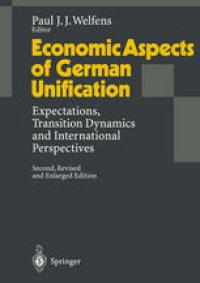
Ebook: Economic Aspects of German Unification: Expectations, Transition Dynamics and International Perspectives
- Tags: Political Science general, History, Economics general
- Year: 1996
- Publisher: Springer-Verlag Berlin Heidelberg
- Edition: 2
- Language: English
- pdf
Paul J. J. Welfens The editor is pleased to present a second edition of Economic Aspects of German Unification which includes new chapters and several postscripts. Almost five years after unification output in the ex-GDR is back to its 1989 level. Due to a massive intra-German resource transfer consumption per capita in eastern Germany has not fallen as much as output and employment which reduced by one-fifth within three years. Given high West German transfers which represented about 5% of West German GDP and more than 50% of East German GDP the fall of industrial output could have been much stronger than had politically been feasible. Hence structural change necessary for productivity growth was dramatic in the ex-GDR where the goods producing sector (manufacturing, mining, energy and construction) strongly changed its proportions; within four years construction almost doubled, and the share of investment goods production reduced by 10 percentage points between 1990 and 1994 and is· now down to 21. 1 %. Mining lost two-thirds of its share in the producing sector which itself was reduced relative to GDP. The share of the services industry increased by 5 percentage points between 1991 and 1994, but with a share of 27. 7% in East Germany's GDP it was still about 9 percentage points lower than in western Germany. By contrast, government accounted for 20. 9% of GDP in eastern Germany, but for only 13. 2% in western Germany.
This book analyzes the German unification after five years with respect to expectations, international impact and internal adjustments - including dramatic structural shifts. German unification is changing central Europe, the EU and international economic and political relations generally, and raises many new questions for Germany itself, Europe, and the whole international community. Will the enlarged Germany become a new economic giant in Europe and can it maintain stability and prosperity? What are the views of Poland and the ex-USSR, and what implications arise for Western Europe and the United States? Finally, how is the triangular relationship between the USA, the EU, and Japan affected, and how does this affect the United States' ability to organize economic cooperation with Japan and Germany.